TABOO OR NOT TABOO, THAT IS THE QUESTION
A recent article in The Spectator has caused consternation in
America. Dominic Lawson explains how two nations are
becoming increasingly divided by a common language
OCCASIONALLY I receive plaintive let- ters from our small but loyal expatriate readership in Saudi Arabia. Usually, they complain that their enjoyment of an issue of The Spectator has been diminished by the actions of the Wahabbi religious cen- sors of Riyadh, who had taken their scissors to an article in the magazine, and removed some offending passages before they could be read by the intended recipients.
I am beginning to wonder how long it will be before The Spectator will receive similarly subtle vetting at the hands of the arbiters of political correctness in the United States of America.
At the beginning of the year we published an article (`Black mis- chief, 1 January) by Amity Shlaes, then a leader writer at the Wall Street Journal which described the fear of blacks pervading the middle-class New York suburbs in the wake of the murder by Colin Ferguson of six whites on the Long Island commuter line. She said that the white com- muters were frightened because Colin Ferguson's 'manic hostility to whites is shared by many of the city's non madmen. It is hostility shared by the black teenagers who push white teenagers out of [subway] cars when they are trying to board a crowded train. It is shared by the (black) city employee behind the bullet-proof glass at the token booth, who looks at two simultaneous arrivals — one white, one black — and says to the black one with a pointed and gratified smile, "You go first."' In Britain the article did not cause much of a stir, although a number of journalists, including Anthony Sampson, a director of the far from right-wing Observer, took the trouble to tell me that they thought it a fine piece of work. In New York, a leading firm of stockbrokers reproduced it in its month- ly newsletter. The senior partner comment- ed that it was a brilliantly perceptive piece about life in the western world's financial Centre, but added, 'This article could never have been published in our country.' The stockbroker's circular finally turned up on the desk of one of Amity Shlaes' col- leagues at the Wall Street Journal. It was speedily photocopied and distributed among the editorial staff. Over the next few days, Amity found herself being treated like Peter Sellers's strike-breaker in I'm All Right, Jack. A number of her colleagues would get out of the office lift if they saw her getting in. Others who had eaten with Miss Shlaes for ten years in the staff can- teen would refuse to sit at the same table with her. By way of further intimidation a delegation of her colleagues marched on the office of the chairman of Dow Jones Inc., the company which owns the Wall Street Journal.
It did not matter that the offending piece had stated, with characteristic clarity, 'The real issue, though, is not race. The statistics bear out the truism that minorities are the greatest victims of minority crimes in cities like New York.' It did not even matter for Amity Shlaes' accusers that they could not demonstrate a single element in her article which was either untrue or even inaccurate. Her crime was far greater than being mere- ly wrong. She had written the truth, regard- less of the offence it might cause. And in modern America, or at least in its main- stream media, that is simply not done.
We should ponder here the state of modern American journalism: endowed with intelligent and able people who are quite willing to sup- press what they know to be valid opinions in order not to endure hos- tility from their stupider and less able colleagues. And as for their mutual readers, presumably they are considered to be so very stupid that they will neither notice nor mind the wide discrepancy between what they are told and what they experience in their own lives.
As a matter of fact, the readers increasingly do notice the discrepancy, and they increasingly do mind. In recent years the right-wing 'ghetto press' — as it is sneeringly called by the mainstream media — has been growing at a remarkable rate. Over the past few years, the American Spectator (no relation), one of the few long-established publications to take a con- sistent stand against political correctness, has produced an eightfold increase in cir- culation. Not far behind is the National Review, edited by an ex-Daily Telegraph man and former speech writer for Mar- garet Thatcher, John O'Sullivan.
It is clear that the American public, as befits a great democratic nation, knows when it is being fed what Damon Runyon called 'the old phonus balonus'. Were such papers as the New York Times and the Washington Post not companies with gerry- mandered share structures there is little doubt that the ordinary shareholders would be clamouring for some relief from the dead hand of liberal self-censorship.
A similar phenomenon is occurring in American current affairs radio. One pro- gramme above all, hosted by Rush Lim- baugh, has had an extraordinary popular success. From a standing start five years ago, Mr Limbaugh's show now has an audi- ence of 20 million. Mr Limbaugh, you see, delights in poking fun at the politically cor- rect. He does so with vulgarity and crude- ness. For example, Mr Limbaugh consistently refers to feminists as 'feminazis'.
The point is that if the mainstream media jointly and severally decide to censor themselves, then the only people who ques- tion that orthodoxy will tend to be those at the extremes. In many ways this is undesir- able, and destabilising for American soci- ety. It would be far better if part of the mainstream media were to take up the task of challenging the Washington Post/New York Times/Boston Globe consensus. The debate would at least then be civilised, and possibly even interesting.
But, in the meantime, another article written out of America for The Spectator has caused consternation among the grand folk of the media in that country, while passing almost unnoticed here, where the overwhelming majority of our readership. live. The article (`Kings of the deal', 29 October) was written by William Cash as a response to a 'Special Report' in the Octo- ber issue of the American magazine Vanity Fair called 'Redefining Power in America: The New Establishment'. The Vanity Fair piece took as its starting point the classic definition of Establishment in The Specta- tor by the American journalist Henry Fair- lie in 1955, then purported to prove that the most powerful men in America were now centred on the West Coast and partic- ularly around Hollywood (this is Vanity Fair, remember), and tried to find common factors among the men (and Barbra Streisand) it termed 'The New Establish- ment'. Prominent among this new elite were Hollywood big-shots such as Michael Ovitz, the town's top agent, Gerald Levin, the president of Time Warner, David Gef- fen, chairman of the eponymous company, Jeffrey Katzenberg, the former chairman of Walt Disney Studios, and, of course, Bar- bra. Of course Barbra.
Vanity Fair, with a certain panache and preening, made the point (and made it, and made it) that these people were anything but the old White Anglo-Saxon Protestant (hereinafter known as Wasp) establish- ment. 'It's their world now. Welcome to it,' concluded Vanity Fair's sortable editor in chief, Graydon Carter.
What struck William Cash, was that, while strenuously pointing out that the New Establishment was not Wasp, Vanity Fair had at no point in a survey the size of a small book mentioned that most of the
`By golly, you're right. There is some sort of warning on the side of the pack.'
members of the soi-disant 'New Establish- ment', particularly in Hollywood, are Jewish. In his article, Cash went on to point out that there was in fact nothing new in this, that Hollywood had for well over 50 years been the scene of triumphs on the part of the most talented Jewish businessmen. He con- cluded that the main difference was that whereas the old moguls such as Warner and Mayer craved acceptance by the old Wasp establishment, and mimicked the staid clubs and horsey pastimes of the Anglophile East Coast elite, the new Hollywood moguls were more secure in their own identity, and need- ed no such reassurances.
As I say, the article caused little com- ment in Britain when it was published. However, Mr Michael Williams-Jones, the chief executive of United International Pic- tures in London, which distributes films abroad for MGM, Paramount and Univer- sal, took the trouble to send faxes of the article to his contacts in Hollywood. Mr Williams-Jones wrote in an accompanying note, 'The article is odious in its innuendo and inaccurate in its facts.' At the other end the moguls got in touch with Mr Bernard Weinraub, the highly experienced Los Angeles correspondent of the New York Times. While none of them wished to be quoted personally, Mr Weinraub report- ed that they were collectively of the view that the Cash article was 'disgusting', `despicable', 'bigoted' and 'odious'. The most upsetting words which Mr Weinraub was able to quote from Cash's article were that he described Jews as `fiercely competitive', 'compulsive story- tellers' and 'talented negotiators'. Mr Weinraub appended to these exact extracts from Cash's article his own comment: 'Few in Hollywood could recall such an anti- Semitic article in a mainstream publica- tion.' Following Mr Weinraub's article, the Anti-Defamation League swung into action from its New York office — as a result of this one of our valued advertisers cancelled its contract with us — and the Los Angeles Times ran a leader page article to denounce young William Cash. The New York Times article appeared on Monday 7 November, and was given the honour of the front page in the paper's Arts section. It quoted me, absolutely accu- rately, as saying to Mr Weinraub that The Spectator seeks to be 'highly polemical and highly controversial. There is a difference between what is deemed acceptable in an American paper and what is deemed acceptable in a British paper. American papers have a code of political correctness. It's simply impossible to run views counter to that product.' Mr Weinraub added, 'Mr Lawson, who said he was Jewish, remarked that he did not necessarily agree with the views of authors in his magazine. He said he was "well aware of the sensitivities of Jews" but had had no second thoughts about publishing the article.' Mr Weinraub had called me on Sunday evening (the 6th). He seemed a little agitat- ed. I suspect he was most offended by William Cash's remark that the New York Times was the 'official mouthpiece' of the new Jewish establishment. I now accept without reservation that this allegation is totally without foundation. Aside from any- thing else, a newspaper which argues in an editorial, as the NY Times did last April, that it would be wrong to elect white males to the US Supreme Court, can hardly be called a Jewish mouthpiece. The NY Times clearly believes that most of the Jewish members of the American legal profession should be barred from the highest office.
Mr Weinraub's own article was very well- written — I would have been happy to have published such a piece in The Spectator, although I didn't agree with it. But it did not quite do justice to the spice of our tele- phone conversation, part of which went as follows: Self (after being told, at length, how offended le tout Hollywood was by Mr Cash's article): I am quite sensitive to the attitudes of Jews to this sort of thing.
Weinraub : Why do you say that?
Self: Because I am Jewish.
Weinraub: What does that mean?
Self: It means I am a Jew Weinraub: Jews put Jews in gas ovens! Self: What a very pleasant analogy.
(It was just as well that I did not mention to Mr Weinraub that, according to The Book of Jewish Record and Lists (Robson Books £8.99), 'the eleventh most popular Jewish name change' is from Kinderlehrer to Cash.) Now we are getting to the point, and it is one which lifts the current Spectator con- troversy quite out of the range of mere matters of political corrrectness. Anti- Semitism has an ancient and foul history, and Americans Jews, many of whom can name relatives who were exterminated in the Holocaust, are understandably highly sensitive to even the faintest whiff of anti- Jewish prejudice. But it is simply wrong, and hysterical, to equate what we can at worst call British snobbery with the genoci- dal impulses and actions of the Third Reich. To link young William Cash, who is no anti-Semite, with Julius Streicher and Joseph Goebbels, 'who identified Jewish involvement in financial markets as a justi- fication for, and a means to fanning the flames of, bigotry and genocide', as Rabbis Marvin Hier and Abraham Cooper did in last week's Spectator is frivolous, and, I might add, defamatory abuse.
I know manic anti-Semitism when I see it, and I'm not in the habit of publishing it. Here, however, by way of exception, is a (not untypical) example of the genuine article, sent to me recently by someone who signs himself 'One interested in both truth and justice':
To the Editor: I have been a subscriber to The Spectator for many years .. I have just learned from a Brit friend that you are a Jew. It is so hard to tell you Khazars from real Englishmen by your names. However your reluctance to have anything negative con- cerning Jewry is now understandable. I would like to subscribe to a magazine that is edited and owned by fellow Aryans. I'll keep look- ing. I won't sign my name; you chaps are too vindictive.
And here is another, slightly madder example of the genre:
Dear Sir. You must have a gaggle of Jews assisting you there at The Spectator, Mr Edi- tor. David English (a Jew? so hard to tell since Jews are so adept at adopting the most `English' of English names) wrote in the Diary of 30 October 1993 a typical Jewish piece ... You are so anti-Nazi, so anti-Ger- man.
This letter was signed 'Truth Seeker', and both letters, interestingly, were posted from the United States.
As a matter of fact, we have published a few articles which might be broadly con- strued as anti-German, and it is true, as I Pointed out to Mr Weinraub, that The Spectator from time to time publishes
pieces which make polemical generalisa- tion about national attitudes and charac- teristics. But generalisations about national or ethnic characteristics are not merely gratuitous, still less redundant. Understanding of the German character is a useful and valuable aid to analysing the history of modern Germany, for example. The Hollywood executive, Mr Barry Isaacson, who last week denounced William Cash as 'a Monty Python carica- ture of an English upper-class twit' clearly understands the value of racial and social generalisations.
It would be an exaggeration to say that only Americans have found something dis- tasteful in pieces which make generalisa-
tions about national characteristics. The editor of the Times Literary Supplement, Ferdinand Mount, in an article in the Sun- day Telegraph two years ago entitled 'The horrible right is horribly wrong', comment- ed, 'This year alone, in Mr [Conrad] Black's Spectator, I have read articles of an astonishing sourness attacking the Italians, the French (twice), the Swiss, the Greeks, the Poles, the Russians, the Germans (pas- sim).' To be fair to Mr Mount, his broader point was that The Spectator's writers had left British political institutions untouched by diatribes about national decay and corrup- tion. Clearly Mr Mount is not in the habit of reading Paul Johnson's weekly column.
However, earlier this year even the saint- ly Mr Mount succumbed. He called me to offer a brilliantly written polemic (`No pon- tification in this realm of England', 29 Jan- uary) about the domination of the English media by Catholic triumphalists. He began what I steadfastly refuse to describe as an article of astonishing sourness with the remark: 'Is it possible that, after all, we shall come to think that Catholic Emanci- pation has turned out to be a mistake?' He went on to recall the good old days when `Catholics had shown that they were just as British as the rest of us', and complained that 'suddenly the most insensitive Protes- tant nostril cannot help detecting an intru- sive whiff of incense, the dullest Anglican air cannot fail to catch a note of triumphal- ism'. Mr Mount further remarked that 'the paranoic literalism of the Catholic cam- paigners against Maastricht seemed to have a fractionally deranged and, I can't help adding, alien quality to it'.
`If any of my remarks should happen to give offence to good Catholics,' added Mr Mount generously, 'they might care to reflect that the Anglican Church and clergy have had to put up with a thousand times worse from Catholic polemicists ... it is the Pope's big guns who dominate the media.' Now insert the word Jew, where Mr Mount uses the word Catholic, and you realise how innocuous by comparison is William Cash's now notorious article — it scarcely deserves the word 'diatribe'. And neither Mr Cash nor even Mr Mount was suggesting that Jews or Catholics should
suffer any discrimination, let alone suffer wholesale slaughter at the hands of a Wasp Sturmabteilung manned by pure-bred Old Etonians such as themselves.
The question is whether Jews should be as robustly unparanoic in their response to Cash's article as Catholics have been to Mount's deliberately provocative polemic. Perhaps the best example of a mature response to mild anti-Semitism was expounded in The Spectator by Barbara Amiel, before, I should add, she was mar- ried to our proprietor, Conrad Black. In `Jews your partners' (3 November 1990) Miss Amiel reported her embarrassment when, at a ball, she was seated next to a man who drew attention to the Jewishness of a number of businessmen who had recently been convicted of financial misde- meanours, such as Gerald Ronson, Ernest Saunders and Michael Milken. Ms Amiel's tedious interlocutor did not realise that she was Jewish. Ms Amiel later wrote:
Although the conversation depressed me, it didn't make me angry. I don't find it illegiti- mate for one group to have an opinion about the characteristics of another group. Group characteristics never turn out to be accurate when applied to individuals but they may be statistically accurate in terms of the group as a whole. Sometimes these views raise rather interesting and valid questions. Jews, after all, have all sorts of strong views about Gen- tile society such as the way they deal with their families (meanly), alcohol (copiously) and their emotions (anal retentive).
Erroneous opinions on the Jews are no more illegitimate than any other erroneous opin- ion. One crosses the line only when you believe that the opinion you hold of another group entitles you to injure or restrict them in some way, such as denying them access to certain professions or passing laws to curtail their civil liberties.
It is, in fact, possible to make a very nice living by making generalisations in public about Jews. Such as: 'Jews don't go to the theatre to see a show. They go to the the- atre to hear their own opinions of the show. And the Jews won't buy drinks. Only a Gentile would be willing to pay $2.75 for a Coca-Cola.' So: Jews are over-opinionat- ed and money-obsessed. These, almost ver- batim, are gags from a show called Jackie Mason: Brand New, which was an immense hit on Broadway. Jackie Mason can get away with it . He is the son of a rabbi, his three brothers are rabbis, and he was ordained as a rabbi.
One might argue that Jackie Mason is a beneficiary of the Limbaugh effect: that as the mainstream becomes ever more self- censoring, rather crude and unedifying people step into the spotlight — and finan- cial rewards — that should be enjoyed by the more thoughtful. But there is another point about these politically incorrect humourists. They are offering essential truths, however brashly. What makes peo- ple laugh at jokes is the honesty in them. Give me the name of a Nazi humorist and I'll give you the name of a comic who never raised a laugh.
One might even claim that the likes of Limbaugh and Mason have the role in modern America that underground satirists had in Russia during the late Soviet years. They were popular, and even loved, because they were the only people who could publicly demonstrate the absurdity of the official media dogma — the bogus brotherhood of man, promulgated in the USSR by Pravda and Izvestia, and in the USA by the likes of the Washington Post and the New York Times.
I must confess, however, that I had not appreciated, when publishing William Cash's article, just how far political correctness had travelled in the land where freedom of speech is guaranteed by the constitution. I accept that William Cash's use of the word `cabal' — when asking if any such thing exist- ed in Hollywood — was unfortunate. But then he went on to say that, if it existed, it was, as 'a form of professional incest, no worse than, say, public schoolboys in the city [of London]'. For this — to be told that they are as bad as public schoolboys — the Anti- Defamation League and its billionaire back- ers among the Hollywood elite turn their big guns on the 20-something Mr Cash. One wonders what steps they would take if they ever encountered genuine anti-Semitism, such as that which is currently sweeping Rus- sia (about which Hollywood moguls have nothing to say).
I had, besides, thought that most of the generalisations about Jews in the offending Spectator article were wholly favourable, and therefore would counterbalance any irritation about the characterisation of most Hollywood Jews as vulgar. I did not realise that even favourable generalisations are now considered intolerable. In an arti- cle in the New Republic of 31 October, `Race: a response', the journalist Leon Wieseltier remarks of a recent book (The Bell Curve, by Murray and Herrnstein) about the heredity of IQ, 'When I read that "Jews—specifically, Ashkenazi Jews of European origins — test higher than any other ethnic group" I am repulsed.' Mr Wieseltier, the literary editor of New Republic, is the nearest thing the political correctness mob have to a cultural Gaulelt- er. In an interview with New York magazine earlier this year Mr Wieseltier referred grandly to 'part of my job of policing the culture'. (See the policeman wield his trun- cheon in this issue's letters pages.) Charles Fleming of Newsweek, who wrote a report on this great outrage per- petrated by William Cash, told me that what had most galled Hollywood were Cash's remarks that the Jews are 'always compulsive story-tellers and talented negotiators, are extremely compatible with the executive side of the movie busi- ness'. When I showed Cash's entire article to my grandmother, to gain the opinion of a Jew whose historical memory goes back far further than Barbara Amiel's or mine, she merely commented. 'All facts: we are better at some things.' According to modern American political discourse, therefore, my grandmother is an anti-Semite. Am I allowed to say that I find that offensive?
My grandmother also said something else after reading the article. She recalled the time that she went to America in the 1930s with her husband, who had a busi- ness partner there. While the men were at a meeting, the American's wife took my grandmother to her club. This woman was clearly of the view, still prevelant in Ameri- ca, that there is no such thing as a British Jew. Once inside the doors of the institu- tion she turned to my grandmother and said, 'This is a very exclusive place. No Jew has ever crossed the threshold.'
`I'm very sorry,' replied my grandmother, `to have polluted your club.'
Here, too, I must confess to some naivety. I had thought that this sort of inci- dent, which would now be almost incon- ceivable in Britain, no longer happened in the United States. But following the fracas over Cash's piece I have rung up a number of Jewish friends in America and they tell me that 60 years on the same sort of segre- gation is still commonly practised among the beach and country clubs. One leading Jewish businesswoman told me how her local friends would apologise to her when they joined the clubs reserved for Gentiles, but explain, 'You see, the facilities are so good.' My friend quite understands. But this has made me realise why the American media are quite so neurotic about generalised remarks about blacks or Jews, why they are quite so slavish to the humourless ethos of political correctness. They realise that their own country is in fact riven by social divides along racial and religious lines. But no amount of silence on the matter will make the differences disap- pear. And at The Spectator, we will contin- ue to point that out.
Dominic Lawson is the editor of The Spec- tator.

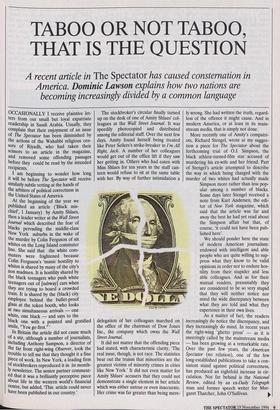
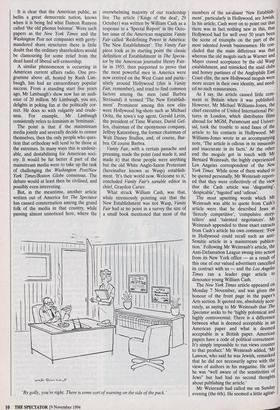
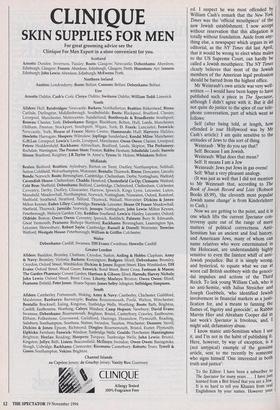
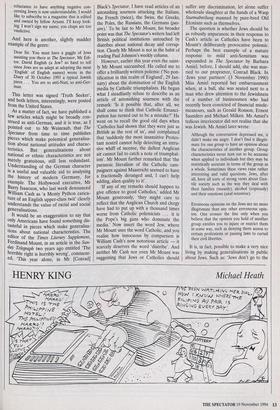
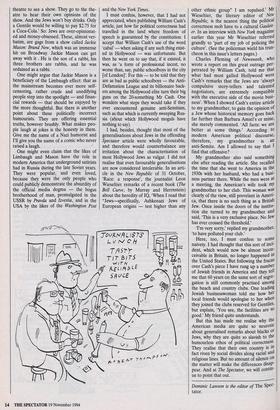
















































































 Previous page
Previous page